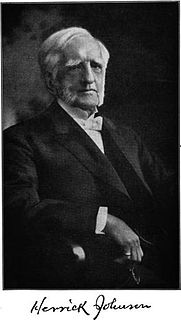A Quote by Herrick Johnson
Christianity, Christ, heaven, hell, the judgment, sin, holiness, God,--these, and whether they be true, or false, and our personal relations to them, whether they be right or wrong, are things to know about, not to be doubting or guessing about.
Related Quotes
Either Christianity is true or it's false. If you bet that it's true, and you believe in God and submit to Him, then if it IS true, you've gained God, heaven, and everything else. If it's false, you've lost nothing, but you've had a good life marked by peace and the illusion that ultimately, everything makes sense. If you bet that Christianity is not true, and it's false, you've lost nothing. But if you bet that it's false, and it turns out to be true, you've lost everything and you get to spend eternity in hell.
Wondering whether Christianity is real is not the same as wondering whether Christianity is true. If you question the truth of Christianity, you can do something tangible about it. You can read books, take a class, or talk to someone about it. But what can you do when you're already convinced it's true but don't experience it as real?
It is not right, my fellow-countrymen, you who know very well all the crimes committed in our name. It's not at all right that you do not breathe a word about them to anyone, not even to your own soul, for fear of having to stand in judgment of yourself. I am willing to believe that at the beginning you did not realize what was happening; later, you doubted whether such things could be true; but now you know, and still you hold your tongues.
Man can only be certain about the present moment. But is that quite true either? Can he really know the present? Is he in a position to make any judgment about it? Certainly not. For how can a person with no knowledge of the future understand the meaning of the present? If we do not know what future the present is leading us toward, how can we say whether this present is good or bad, whether it deserves our concurrence, or our suspicion, or our hatred?
By salvation I mean not barely according to the vulgar notion deliverance from hell or going to heaven but a present deliverance from sin a restoration of the soul to its primitive health its original purity a recovery of the divine nature the renewal of our souls after the image of God in righteousness and true holiness in justice mercy and truth.
...God has made provision for our holiness. Through Christ He has delivered us from sin's reign so that we now can resist sin. But the responsibility for resisting is ours. God does not do that for us. To confuse the potential for resisting (which God provided) with the responsibility for resisting (which is ours) is to court disaster in our pursuit of holiness.
At the end of the day, if there was indeed some Body or presence standing there to judge me, I hoped I would be judged on whether I had lived a true life, not on whether I believed in a certain book, or whether I'd been baptized. If there was indeed a God at the end of my days, I hoped he didn't say, But you were never a Christian, so you're going the other way from heaven. If so, I was going to reply, You know what? You're right. Fine.
I'm an old man, and I want to lay out what I think I understand. With poems like "Traitor," I'm examining my feelings, my convictions, my understanding of the world, and testing whether they're really true. So that when you hang your holster up, you can make a judgment on whether you have any integrity at all. That's what I care about. That's why I wrote it. If I can't write that poem, then I've got it wrong somehow.
Christians often equate holiness with activism and spiritual disciplines. And while it's true that activism is often the outgrowth of holiness and spiritual disciplines are necessary for the cultivation of holiness, the pattern of piety in the Scripture is more explicitly about our character. We put off sin and put on righteousness. We put to death the deeds of the flesh and put on Christ. To use the older language, we pursue mortification of the old man and the vivification of the new.



































